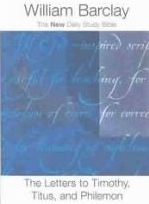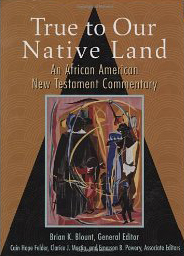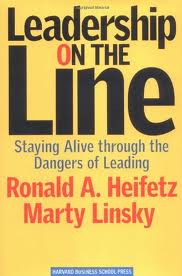|
LECTIONARY COMMENTARY
Sunday, January 22, 2012
Reginald W. Williams, Jr., Guest Lectionary Commentator
Pastor, First Baptist Church of University Park, University Park, IL
Lection – 1 Thessalonians 5:12-19 (New Revised Standard Version)
(v. 12) But we appeal to you, brothers and sisters, to respect those who labour among you, and have charge of you in the Lord and admonish you; (v. 13) esteem them very highly in love because of their work. Be at peace among yourselves. (v. 14) And we urge you, beloved, to admonish the idlers, encourage the faint-hearted, help the weak, be patient with all of them. (v. 15) See that none of you repays evil for evil, but always seek to do good to one another and to all. (v. 16) Rejoice always, (v. 17) pray without ceasing, (v. 18) give thanks in all circumstances; for this is the will of God in Christ Jesus for you. (v. 19) Do not quench the Spirit.
I. Description of the Liturgical Moment
The African American church has historically been the center of the African American community. In one of the richest countries in the world where there should not be a hungry soul, not only have hungry men and women been able to find a meal, but wandering souls have also been able to find a home and tortured souls have been able to find a place of prayer in the African American Church. The African American church has also served as a womb that has birthed many leaders in many arenas.
I am reminded of the lyrics to the song by Charles A Tindley that says: “To serve this present Age, my calling to fulfill. Oh may it all my pow’rs engage to do my Master’s will!” In this present age where materialism, racism, sexism, and militarism are still real, the church must form and develop leaders who empower God’s people to bring God’s kingdom on earth as it is in heaven.
The installation of officers is a prime time to celebrate the leaders whom God has given us, and to challenge those who accept the mantle of leadership in the Church to do so as Christ did—as servant leaders!
II. Biblical Interpretation for Preaching and Worship
Part One: The Contemporary Contexts of the Interpreter
I have been blessed to be tutored by and study great leaders in various contexts. Some of these leaders have been in the Church. Others have been in non-profit organizations. Consequently, I have contextually come to see that there are at least three aspects of leadership that many people under-estimate. First, leadership is laborious, even when it is a labor of love. Many people underestimate the amount of work that leaders do behind the scenes, many times at risk to their own welfare and self care. Second, another painful and disturbingly dark side of leadership that I have been exposed to and have experienced is that leadership can be lonely. Countless hours, ascertaining to excel, coupled with seemingly insurmountable obligations both personally and professionally can leave a leader very lonely. In the labor, which stretches leaders thin, and in the lonely hours, which sometimes cause mental consternation, there may be a tendency for leaders to shut down. Third, leadership can leave one with lacerations. The cuts that come from faithfully extending one’s self time and again, rarely to have one’s own tank refilled, can leave one bruised, cut down, and sometimes cut off. No doubt Paul experienced some of these painful predicaments as a leader in the fledgling Church of Jesus Christ.
Part Two: Biblical Commentary
Paul admonishes us to “quench not the spirit.” In other words, though ministry can be laborious, lonely, and even lacerating, Paul advises and admonishes us to “quench not the spirit.” Why? Likely because he knew that there are times when leaders can allow their own existential experiences to extinguish the flames of the faithful they are called to serve. Hurt people hurt people. Therefore, Paul advises us to be a portal through which the power of God’s Spirit may be passed, and not precluded!
This passage of Scripture is part of the closing of a letter from Paul to the church at Thessalonica. Paul wrote in order to address many issues. The preaching of the second coming had produced many people who simply sat around and waited for the Lord’s return, forsaking the work that was to be done. So Paul encourages them to get up and get to work. The people also had a tendency to disrespect and dismiss leadership in their community. Therefore Paul begins this passage by strongly urging the people to give respect where respect is due. To the entire community, he gives directions that culminate in his declaration to quench not the spirit. He gives some helpful hints on how to be a portal through which the spirit can pass, and not be precluded.
The word quench in the Greek is sbennymi, which means to extinguish as in a fire. Therefore, Paul admonishes leaders and others not to extinguish the spread of the Spirit and to instead encourage purposeful partnerships, engage in persistent praise, and engross yourself in persevering prayer:
- Encourage purposeful partnerships. There are times when leaders use their positions as a means to simply be over and not walk with other. This is not helpful and does not model the ministry of the Master. Leadership that empowers others is leadership that will not quench the Spirit. Therefore, Paul says to admonish the idlers and to encourage those who are faint-hearted and perhaps are not as strong as you are. In a very real sense this is the African understanding of Ubuntu. I am because we are, and because we are, therefore I am. My humanity is tied up in your humanity, and in God’s divinity. Leaders have a vested interest in ensuring that we move together in partnership, in order that the Spirit may be passed along and not precluded.
- Engage in persistent praise. Verse 16 says “rejoice always.” Rejoice has as its root the word joy. Joy is not dependent on what happens on the outside. That’s how happiness is experienced. Joy is what bubbles up from within regardless of what is happening on the outside. As we serve in various roles of leadership, it is incumbent upon us to engage in a lifestyle of praise because of who it is we are serving.
- Engross yourself in persevering prayer. Verse 17 says “pray without ceasing,” and in everything give thanks. Leaders must be engrossed in a purposeful and persistent prayer. The power of the Spirit will not flow if the source of the power is not sought. It is the power of the Spirit which pushes and propels leaders to continue to serve even when they do not feel like serving.
If we continue to allow ourselves to be portals through which the Spirit of God can pass through partnership, praise, and prayer, then the realities of the labor, loneliness, and lacerations will not have the last word! God always has the last word!
Celebration
The life of the Christ models a portal through which the Spirit could pass and not be precluded. In spite of the labor, loneliness, and lacerations to which he was subjected, our Lord encouraged purposeful partnership by selecting 12 to walk with him. He engaged in persistent praise as a lifestyle, not just an event. And he was engrossed in prayer. As we lead we are encouraged by following the Leader who was a portal through which the Spirit could pass, and not be precluded regardless of the labor, loneliness, and lacerations. And because he lives . . . These are difficult times for leaders, but because he lives . . . These are dark times for leaders, but because he lives . . . These are painful times for leaders, but because he lives, we can face tomorrow. For he who holds the future also holds our hand.
Descriptive Details
The descriptive details of this passage include:
| Sounds: |
The sounds of discord; the sounds of peace; saints encouraging other saints; the sounds of the mighty rushing flow of a river;
|
| Sights: |
The sight of a fire extinguisher dousing a fire; early Christians gathered in house churches; church members extolling those in leadership; and
|
| Colors: |
The colors worn by the leaders of the early Church; the colors in a house church.
|
III. Other Sermonic Comments or Suggestions
Music
- I Need You to Survive. By Hezekiah Walker. This song reminds all leaders that leadership is a partnership with others. It also reminds us that we need each other to do the work of the Kingdom. Online location:
http://www.youtube.com/watch?v=LUUHPDUsLJ0
Books

|
Barclay, William. The New Daily Study Bible, 17 volume set. Louisville, KY: Westminster John Knox Press, 2004.
|

|
Blount, Brian K., general editor. Cain Hope Felder, Clarice J. Martin, and Emerson B. Powery, associate editors. True to Our Native Land: An African American New Testament Commentary. Minneapolis, MN: Fortress Press, 2007.
|

|
Heifetz, Ronald A. and Marty Linsky. Leadership on the Line: Staying Alive through the Dangers of Leading. Watertown, MA: Harvard Business Press, 2002.
|
|